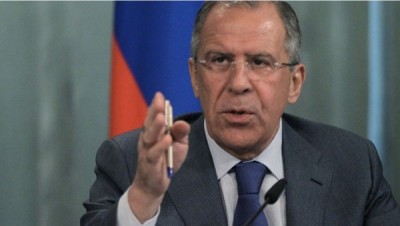Lavrov on US Op in Libya: Countries Fighting Terrorism Should Stay Within International Law

There is a growing understanding in the world that there are no “good” and “bad” terrorists, Russian Foreign Minister Sergey Lavrov told RT. However, any country fighting terrorism must also respect international law, he added.
Recent US commando raids in Libya and Somalia as part of the War on Terror were not conducted in the way global terrorism should be fought, as they apparently violated international law, Lavrov stressed.
“We believe that this is not the way you handle international relations, it’s not the way you fight criminals, even before you prove that they are criminals, before they can testify to any court of law,” the Russian Foreign Minister said in an interview with RT on the sidelines of the APEC summit in Bali.
Admitting that international law regarding counterterrorism is “incomplete” and contains “lacuna… in quite a number of things,” Lavrov said it still provided any countries involved with general principles of law enforcement agency cooperation.
Thus, any law enforcement body hunting down a terrorist suspect should first get in touch with their counterpart in the country of the suspect’s stay and implement certain procedures, the minister stressed.
“We would be very much in favor of making sure that we all fight terrorism in accordance with our national law, if it is our territory, and in accordance with international law, which, I admit, must be further developed,” Lavrov said.
The Foreign Minister then reminded of similar dubious cases involving Russian citizens Bout and Yaroshenko, both of whom were “basically kidnapped” by US agents from Thailand and Liberia in violation of local law, and then given big prison sentences for “not sufficiently proved” criminal intent.
“You cannot strengthen the law by violating the law,” Lavrov reasoned.
‘Afghan ‘freedom fighters’ boomeranged on 9/11’
The root of why more than 10 years of fruitless talks have been spent on a draft of the comprehensive global convention on counterterrorism lies within the belief of some people that “those who use terror as the means to achieve their political goals can’t be called terrorists because they are ‘freedom fighters,’” Lavrov believes.
Such a “contradiction” stems from recent history, starting from the 1979-1989 war in Afghanistan, the minister said.
“Several decades ago, “freedom fighters” was a term coined to describe the mujahedeen in Afghanistan and in some other countries. And then these freedom fighters turned into an organization which we now call Al-Qaeda, which boomeranged on 9/11,” Lavrov said, adding that “you cannot have good terrorists and bad terrorists.”
Now, when it comes to the Syrian conflict, more and more people begin to realize that “the actual situation on the ground” is about “radicals trying to get hold” of Syria and the region as a whole, Lavrov said.
As it becomes apparent that the Syrian extremists fighting alongside the opposition “are moving closer to Al Qaeda,” even those who had been “obsessed with the projection” of the Arab Spring and the fight for democracy in this Middle-Eastern conflict have to admit there is the danger of terrorists getting weight in the ranks of the armed opposition.
“It is not only our conviction – it is also the conviction of the Americans – that we cannot and must not talk to these people. We can only talk to those who opt for the sovereign, territorially integral, secular, multiethnic, multiconfessional Syria,” the minister said, stressing the importance of having the “right mix of opposition groups” at the Geneva-2 conference.
‘No intel agency on earth’ can prove Iran has military nuke program
Russia agrees with Iranian President Hassan Rouhani’s assessment that six to nine months of cooperation between Iran and the International Atomic Energy Agency (IAEA), aided with talks of the 3+3 group, would be enough to have the issues settled and the sanctions loosened, Lavrov said.
It is only vital that Iran had the questions posed by the IAEA “clarified fully,” the minister added, saying that so far the Iranians have been ready to fully cooperate with the nuclear watchdog.
At the same time, there are grounds to believe that Iran might be hiding plans for developing a military nuclear program behind its back, Lavrov said.
“As for the statements regarding the Iranians playing another game and trying to dupe people, I haven’t seen any confirmation by any intelligence – be it Russian, be it European, be it the United States, be it Mossad, which would categorically say that the Iranian leadership has taken a political decision to have a military nuclear program,” Lavrov said, referring to recent statements made by the Israeli Prime Minister Benjamin Netanyahu.
“No intelligence agency on earth has been able, so far, to come to this conclusion,” the minister concluded.
Even the US has recently “agreed that Iran hasn’t taken a political decision to go military in its nuclear program, and therefore we all must avoid statements, which would just antagonize the parties to these negotiations and concentrate on a chance which we certainly have now,” Lavrov said.

